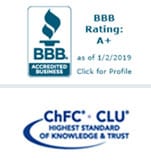
Every year, America’s seniors lose $36 billion to financial elder abuse, a term that covers scams, frauds, theft by family members, and caregiver exploitation schemes which specifically target adults over the age of 50. The American Bar Association calls it the crime of the 21st century, an epidemic which the Executive Director of the National Adult Protective Services Association described as “rampant, largely invisible, expensive and lethal.” Here’s how you can keep yourself and your loved ones safe from financial predators.
Who is at Risk?
While abusers tend to target seniors who are socially isolated, home-bound due to illness, or who reside in senior living facilities, it’s important to understand that anyone can be a victim. This is particularly true in the 49% of cases where the abuser is a close friend, caregiver, or relative. Rosanna Fay at Next Avenue writes about how a family friend took advantage of three elderly family members—all socially active, competent, recently retired professionals—and ultimately conned them out of $60,000.
Warning Signs
Common indicators of financial abuse include:
-
- Large transactions or withdrawals from the person’s checking, savings, or credit card accounts
-
- Unexplained ATM withdrawals
-
- Missing property
-
- The person does not understand their financial situation and appears to be unaware of having signed checks, legal documents, or made payments that directly benefitted the suspected abuser
-
- The person receives substandard or neglectful care despite being able to afford better
-
- The person has a “new best friend” who displays an inordinate amount of interest in their financial affairs
-
- Bills go unpaid or are overdue, but the person’s caregiver frequently receives large bonuses and/or expensive gifts
How to Prevent Financial Elder Abuse?
Although certain risk factors, like financially-unstable relatives, physical illness, and mental decline, are largely out of our control, there are ways to guard against financial abuse. Maintaining a strong social network of friends and family after retirement, taking an active role in managing your own finances, and solidifying an estate plan early on can all help deter potential abusers. It also doesn’t hurt to read up on how to avoid other common forms of financial exploitation like Medicare scams and tax fraud.
What to Do If You Suspect Abuse?
If you suspect that you or someone close to you may be a victim, don’t be afraid to seek help. Financial elder abuse can take many forms, from identity theft to extortion. Use the Department of Justice’s resource roadmap to find elder abuse resources in your area. If you or a loved one are in immediate danger, call 911.


Sara McKinney
saractag@gmail.com
As Cowen Tax Advisory Group’s Digital Content Marketing Specialist, Sara provides in-house copywriting and manages the company’s electronic records system, email marketing, and blog.




